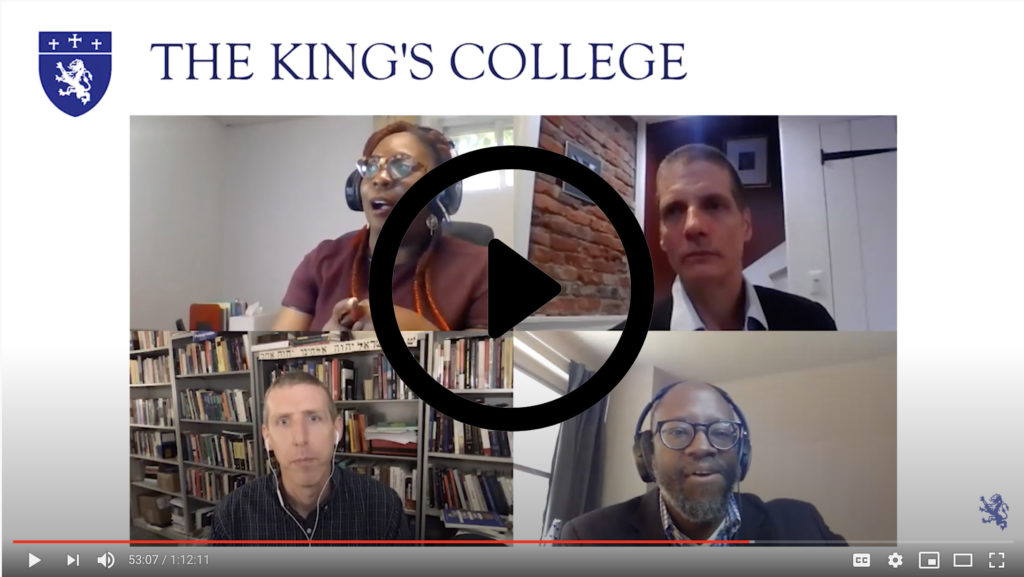Serpent in the Garden: Christian Perspectives on Race Relations in America
In a webinar hosted Thursday, June 18, Dr. Anthony Bradley, Dr. Dami Kabiawu, Dr. David Tubbs, and Dr. Dru Johnson shared Christian perspectives on race relations in America.

On Thursday, June 18, The King’s College hosted “Serpent in the Garden: Christian Perspectives on Race Relations in America,” a webinar featuring four King’s faculty. Dr. Anthony Bradley discussed his research on race, class, and the American criminal justice system. Dr. David Tubbs addressed the complex legacies of the Jim Crow era. Dr. Dru Johnson discussed biblical perspectives on racial justice in America. Dr. Dami Kabiawu delivered opening comments and moderated the follow up Q&A.
WATCH: Full Video Recording of “Serpent in the Garden”
President Tim Gibson introduced the event as a “multi-faceted look on the issues that have led us to the point where we are today.” Kabiawu began with a personal perspective on raising Black children in the United States. She described how her status as a highly educated immigrant had initially protected her from “significant racial encounters,” but that her family was forced to encounter racial prejudices when her sons began school. One son, who scored in the 99th percentile on the SAT, has been told by classmates that “when he gets into a good school it will only be because of the color of his skin.” Kabiawu continued, “My boys have been on the Principal’s Roll almost continuously, they take AP Classes, they belong to honor societies, they perform well in school, yet, they are made to feel like opportunists.”
Bradley opened his presentation arguing that recent unrest and protests following the death of George Floyd are the combined outcome of a 120-year history of over-policing and police brutality plus “our inability to reconcile many of the racial issues that we failed to address at the end of Jim Crow.” America did a “patchwork of federal programs” but never fully resolved the wounds of Jim Crow through a process of transitional justice such as Germany, South Africa, and Rwanda have done, he said.
On the topic of over-policing, Bradley discussed research in his book Ending Overcriminalization and Mass Incarceration: Hope from Civil Society (Cambridge, 2018). In America, “We use the criminal justice system to control people that we don’t like,” particularly the poor. Even the African American middle-class has at times employed a strategy of excessive punitiveness towards lower-class African Americans. Bradley said, “Maybe we should think about what it means to reconstruct a criminal justice system with the human person as the center, where human dignity and the rule of law reigns, rather than our personal preferences for particular races or classes of people.” He closed by sharing recent data that shows that “conservative Christians are the most punitive cohort in this country” and challenged listeners to consider why many conservative Christians prefer punishment rather than mercy towards the poor.
According to Tubbs, the recent protests are about more than just “the practices and protocols of law enforcement”: they represent a national identity crisis. Tubbs said that the identity of a nation derives from its ideals, history, and institutions, but Americans have a practice of focusing attention on our ideals and downplaying our actual history and institutions.
Despite the ideal expressed in the Declaration of Independence that all men are created equal, Tubbs said that a principle of white supremacy manifests itself in our history in the practice of chattel slavery and the legal and social segregation of the Jim Crow era. The change in laws brought about in 1964 and 1965 was not enough to change attitudes and bring goodwill between Black and white Americans. We hold an overly idealistic interpretation of our nation’s identity as hard truths of American history, like “lynching as a means of opposing terror on Blacks” and the “dispossession of Black families by driving them off their property,” are often left out of high school textbooks. Tubbs said,
The work of the Civil Rights movement is not finished. This is a sobering conclusion for me, since I often tell my students that the Civil Rights Act of 1964 was the greatest piece of federal legislation in the 20th century. But the events of the recent past have underscored to me that legislation is not enough.
What we need to heal as a nation is “something akin to what other countries have adopted, commonly called commissions on truth and reconciliation,” said Tubbs, citing Bradley’s discussion of transitional justice.
Johnson addressed the topic of race relations from the position of Hebraic principles of neighbor-love. “Scripture commands, from Old to New Testament, that the people of God be a systematically xenophilic people. Xenophilia is the Greek term usually translated ‘hospitality’ but it quite literally means foreigner love or stranger love.”
Johnson said that the ideals of equality that we aspire to today trace to laws of ancient Israel that were unique in their time for emphasizing protection for the vulnerable. These laws implore the people of God to “make sure you are not crushing the vulnerable, showing disparate treatment towards foreigners versus native-born, the rich or the poor; that you don’t make inside or outside or us-versus-them distinctions and treat people accordingly.” He said that the Biblical command to love others as yourself calls us to enrich our imaginations so that even if we have to arrest someone, we can “imagine them to be not just the image of God but your own most personal relationship.”
For the remainder of the event, Kabiawu directed audience questions to the panelists.
On the question of whether people need to have a conscious bias to commit racist acts, Johnson said, “Biblical authors are keenly aware that you can get things wrong. There need to be lots of checks and balances in your heart and in your community.”
On how to understand criminal statistics of “Black on Black” crime, Bradley said, “What we tend to do is to tribalize those things. We use the statistics that signal to our tribe that we still embody the virtues and the priorities of the tribe. One of the things Christians can do that’s distinctive is step out of the tribe. . . and say, ‘because this is God’s world, we need to look at all of these issues.’ That’s a very important issue, and so is police brutality, and so are police unions.”
On the value of truth and reconcilation commissions to counteract false narratives about segregation and slavery, Tubbs said, “Truth in this factual sense, in this historical sense, is very precarious, very vulnerable.… Certain facts must be established as the basis for the conversation to go forward.”
Watch the full presentations and discussion here.





